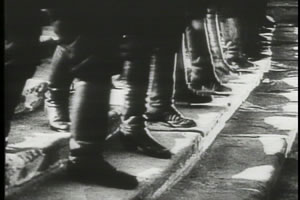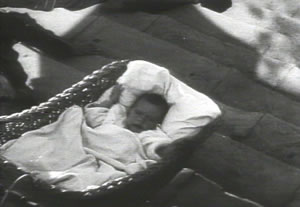The Battleship Potemkin
|
|
- For the battleship, see Russian battleship Potemkin article
The Battleship Potemkin (Russian: Броненосец Потемкин, bronenosets potyomkin), sometimes The Battleship Potyomkin, is a 1925 silent film directed by Sergei Eisenstein. It is a fictional story meant to glorify a real-life event that occurred in 1905, the Battleship Potemkin uprising, when the crew of a Russian battleship rebelled against their oppressive officers during the Tsarist regime. Potemkin has been called one of the most influential films of all time, and during the 1950s it was named the greatest movie of all time by Britain's Sight and Sound cinema magazine.
Deliberately written as a revolutionary propaganda film, Eisenstein used this film to test his theories of "montage." The revolutionary Russian filmmakers of the Kuleshov school of filmmaking were experimenting with the effect of movies on the audience, and Eisenstein edited the film in a way that would produce the greatest emotional response, so that the viewer would feel sympathy for the rebellious sailors of the battleship Potemkin and hatred for their cruel overlords. In the manner of most propaganda, the story was written in a very simplistic manner, so that the audience could clearly see who they could sympathize with.
Eisenstein's experiment was a success. Potemkin was a hit with Russian audiences, and it was released in limited venues around the world, where audiences responded positively.
| Contents |
The Odessa Steps sequence
The most famous scene from the movie is the massacre on the Odessa Steps, where ruthless Tsarist soldiers march down an endless flight of stairs in a rhythmic, machine-like fashion, slaughtering a crowd of innocents as they attempt to flee down the stairs before the soldiers reach them. This scene has been endlessly referenced in many motion pictures, with one of the most famous homages occurring in Brian De Palma's version of The Untouchables (and also spoofed in Woody Allen's Bananas and Terry Gilliam's Brazil).
Historical accounts of the 1905 revolution contrast with Eisensteins portrayal of the events at Odessa. In his essay Battleship Potemkin: Film and Reality, historian D.J. Wenden summarizes the event in a manner markedly different from the film:
- There was a massacre on the steps, but it occurred on the night of 15-16 June. Four of the five eyewitness accounts left by those onboard the ship [the Potemkin] mention the outburst, but they express comparatively little concern and no sense of involvement with this drama onshore. The massacre was not a slaughter of innocents but a desperate, brutal attempt to maintain order in a city in revolt. The strikes in Odessa and other cities in Russia in 1905 were outbursts of primitive anger by industrial workers and peasants. Once the veneer of control exercised by czarist administration was broken, the crowds looted and drank their way through shops and warehouses The shooting on the steps did take place, but it took place at night and was the frenzied reaction of a military authority trying to prevent a crowd from surging up the steps and not, as portrayed in the film, the cold-blooded daytime murder of a happy crowd innocently waving at the battleship in the harbor. - D.J. Wenden, reprinted in Why Docudrama: Fact-Fiction on Film and TV, edited by Alan Rosenthal (ISBN 0809321874)
Historical Context
Being released in 1925, it has been suggested that the film was a response to the social disorder of the Russian Civil War. 1921 had seen the Kronstadt Rebellion, a naval revolt in St Petersberg, in response to the War Communism policies of Bolshevik rule. The release of the film could be seen as part of an ongoing attempt to pacify and rehabilitate the Navy and the Russian people as a whole.
Previous Censorship and Recent Restoration of Film
After its premier in Russia, it was later shown in a edited form in Germany, with some scenes of extreme violence edited out by its German distributers. A written introduction by Leon Trotsky was also cut from Russian prints by the Soviets after he ran afoul of Josef Stalin. The film was banned under the Nazis in Germany. It would also be banned at one time under the British and French for its revolutionary zeal.
In 2004, a three year restoration of the film was completed. Many excised scenes of violence were restored, as well as the original written introduction by Leon Trotsky. The previous titles, which had toned down the mutinous sailors' revolutionary rhetoric, were corrected so that they would now be an accurately translation of the original Russian titles in the film.
Legacy
Battleship Potemkin was voted the greatest film of all time at the Brussels, Belgium, World's Fair in 1958. It also was voted as the greatest silent film of all time as well as the greatest foreign film of all time.
The original score was composed by Edmund Meisel. A salon orchestra performed the Berlin premiere in 1926; its instrumentation was flute/piccolo, trumpet, trombone, harmonium, percussion and strings without viola. Meisel wrote the score in twelve days and nights due to the late approval from the censorship board. Due to this problem, Meisel would repeat large sections of the score, unchanged, in an effort to complete the project. Composer/conductor Mark-Andreas Schlingensiepen has reorchestrated and improved the score based on the original piano score and has adjusted it to fit the reconstructed version of the movie available today.
In its commercial format (on DVD, for example) the film is usually accompanied by pieces of classical music that have been subsequently added. In an attempt to update the film for the modern day, Pet Shop Boys have composed a new soundtrack which was performed for the first time in September 2004 at an open-air concert in Trafalgar Square, London with the Dresdner Sinfoniker orchestra.
See Also
- List of movies
- List of actors
- List of directors
- List of documentaries
- List of Hollywood movie studios
- Movies that have been considered the greatest ever
External links
- Download a version of Battleship Potemkin from Liketelevision.com (http://www.liketelevision.com/web1/movies/potemkin/potemkinfull.ram?channel=258&format=movie&theme=guide)
- Read a review from the Maoist Internationalist Movement (MIM) (http://www.etext.org/Politics/MIM/mn/text.php?mimfile=mn230/Potemkin.txt)
- Template:Imdb titlede:Panzerkreuzer Potemkin
fr:Le Cuirassé Potemkine it:La corazzata Potemkin ja:戦艦ポチョムキン lb:Panzerkreuzer Potemkin sv:Pansarkryssaren Potemkin zh:波将金号战舰


